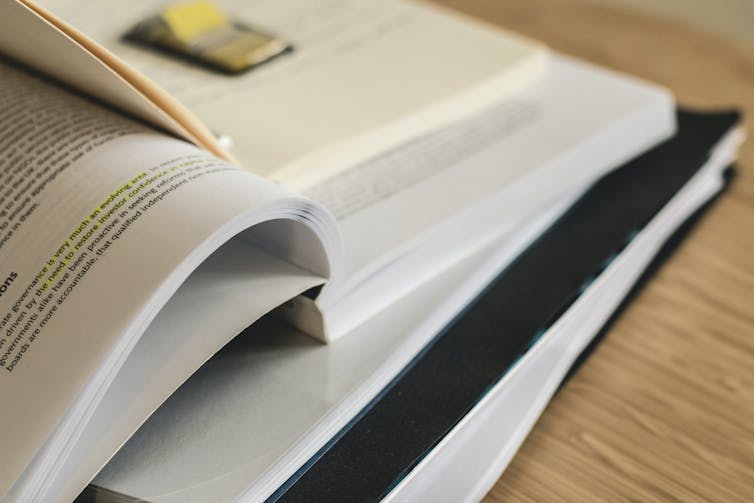October 4, 2023
Avoid cramming and don’t just highlight bits of text
How to help your memory when preparing for exams
With school and university exams looming, students will be thinking about how they can maximise their learning.
Memory is a key part of how we learn.
If students understand how memory works, they can prioritise effective study habits. This will help for exams as well as their learning in the longer term.
What is memory?
According to cognitive psychology (the study of our mental processes), there are distinct types of memory. Each plays a different role in effective study:
-
sensory memory temporarily holds vast amounts of new information . This includes everything we have just seen, heard, touched or tasted. If we pay attention to that information, it moves into working memory for processing. If we don’t pay attention, it is discarded.
-
working memory is our brain’s control centre. All conscious , including remembering, calculating, planning, problem-solving, decision-making and critical thinking happens in our working memory. However, if we have too much on our minds, working memory can easily become . This makes it important to offload knowledge and skills to long-term memory.
-
long-term memory is our brain’s library. When new knowledge or skills are well practised, they are “encoded” from working memory and into . Here they are stored in vast networks called schemas. To use those knowledge and skills again, we retrieve those schemas back into working memory. The more we encode and retrieve knowledge and skills, the stronger those memory pathways become. Well-learned schemas can be retrieved automatically, which creates space in working memory for new thinking and learning.
How to help your memory when preparing for exams
Not everyone likes exams and educators their advantages and disadvantages.
But if you are a student who is studying for exams right now, here are some tips to help you use your time well:
-
create the conditions for attention: put your phone away and remove distractions. Remember, to bring information into working memory and keep it there. Loss of attention, or mind wandering, can result in poorer learning. Harvard professor of psychology Dan Schachter calls absent-mindedness one of the “”.
-
consider your subject area: different disciplines ask different kinds of questions and you should study with these in mind. In a Year 12 English exam, for example, you might be asked to write a response about your interpretation of a particular text. So don’t just re-read the text; effective study involves drawing out themes and insights, practising your arguments and seeking feedback.
-
minimise “shallow” study: most students report text when studying. But these are less effective than other study techniques. Shallow study or focuses more on surface features and . This encourages rote recall over genuine understanding and leads to poorer learning. In , re-reading a textbook twice in a row offered no advantage over reading it for the first time.

-
maximise “deep” study: this involves actively using the information you are studying. Depending on your discipline, this might include , constructing your own questions, , identifying themes, evaluating existing arguments, , or explaining concepts to others. This deep encoding results in stronger schematic networks, which are more easily reactivated when you need them.
-
move beyond worked examples: worked examples are step-by-step illustrations of the processes to solve a problem. They can be because they show you how to use a particular strategy. They also help to reduce working memory load. But as you , it is more effective to draw those strategies from long-term memory yourself.
-
take breaks: research with Australian shows even a five-minute rest break can support attention – the gateway to learning. Research also shows rest can help you consolidate memories.
-
don’t cram: the so-called “spacing effect” shows memory and both benefit from rather than massed learning. This means six half-hour sessions are better for learning than one three hour block.

-
mix up your study: this could mean questions and activities, so your brain is forced to compare, contrast, refine, and draw distinctions between concepts and approaches. This is known as “”, and has been shown to boost learning in subjects such as maths, music and medicine.
-
don’t skip sleep: sleep is crucial for the of memory or new connections or insights you have made.
-
give yourself enough time: unfortunately, there are no shortcuts here! Each time you drawing specific knowledge and skills from long-term memory into working memory, you are etching a memory super-highway. The , the better and quicker you become – which is what you will need come exam time.

, Head of School of Education and Professor of Educational Psychology,
This article is republished from under a Creative Commons license. Read the .
UOW academics exercise academic freedom by providing expert commentary, opinion and analysis on a range of ongoing social issues and current affairs. This expert commentary reflects the views of those individual academics and does not necessarily reflect the views or policy positions of the ÁńÁ«ĘÓƵapp of ÁńÁ«ĘÓƵapp.
:format(jpg)/prod01/channel_3/assets/media-centre/UOW-BusinessSchool-November2022-1600X900-499X281.jpg)